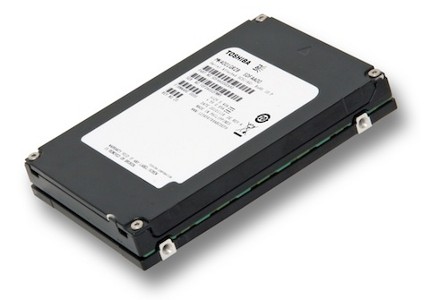Even though consumer drives have moved over to the (significantly) more affordable MLC memory, SLC chips still offer the absolute best in performance and reliability. Coincidently, this means that they are ideal for enterprise drives like Toshiba's newly announced MKx001GRZB family of SSDs.
The new 2.5in drives make use of new 32nm enterprise-class single-level cell (eSLC) flash chips that enable some breathtaking performance numbers. Sequential writes can hit 510MB/s with read speeds reaching as high as 230MB/s, while 4k random read and write performance is on the order of 90,000 and 17,000 IOPS, respectively. Thankfully the drives use the 6Gbps SAS interface, so they shouldn't be bottlenecked by the connection speed.

The drives themselves will come in 100GB, 200GB and 400GB usable capacities, each of which will come with an extra 28 per cent reserved for overprovisioning. The product lifespan is expected to be somewhere around five years, with no limit on the total storage capacity for the larger two drives. However, the 100GB model is likely to hit its capacity after around eight petabytes worth of 4k random writes.
Being enterprise drives, Toshiba's latest come in a 2.5in form factor with a 15mm z-height. Power usage is around 6.5W which translates to efficiency of about 13,800 write IOPS/Watt.
The manufacturer will start sampling these drives to partners in the first quarter of the new year, with volume production expected to start sometime in H1 2011.
As in the consumer space, enterprise SSDs are expected to remain a relatively niche market for the next few years, but it looks Toshiba will be more than ready once the mainstream decides to catch up.













